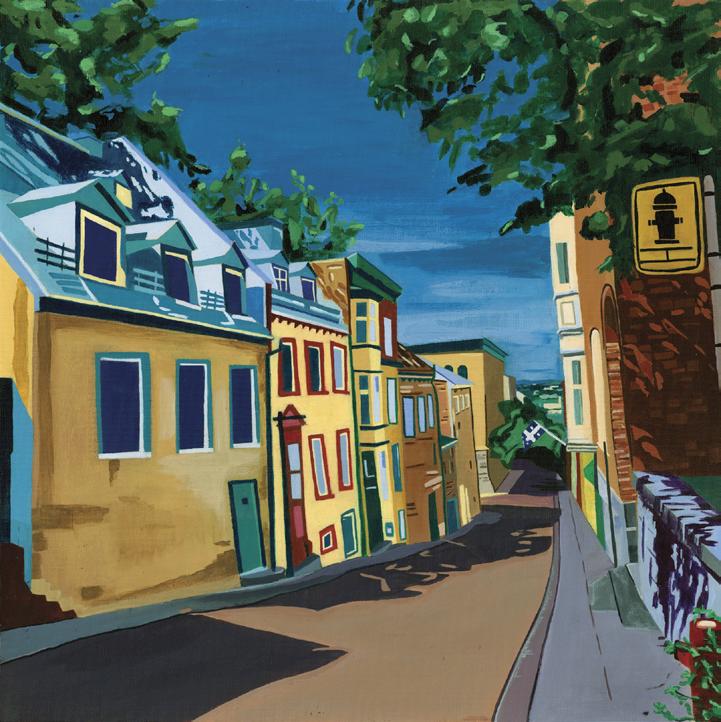BOSTON UNIVERSITY ACADEMY



Lead Editor
Ada Habip ’25
Camilla Horta ’26
Members & Contributors
James Beebee ’28
Owen Bergstein ’26
Kaya Ciamarra ’28
Leeza Ciccarone ’27
Josephine Chao ’27
Kendree Chen ‘25
Audrey Chuang ’27
Shirley Chude-Sokei ’28
Genevieve Gouvernet ’27
Nicole Hadar ’27
Charlotte Harris ’26
Kaela Harrison ’25
Finn Hoebelheinrich ’25
Camilla Horta ’26
Momoko Hotta ’26
Matthew Jackman ’26
Petra Jones-McKeon ’27
Eliana Kofman ’28
Georgie Linscott ’26
Kelsey Liu ’26
Quinn Lynn ’25
Coco Mueller ’26
Millie Mueller ’26
Yuan Mou ’27
Alexander Nowosielski-Spleowron ’26
Vincent Pacheco ’26
Alexandros Paschalidis ’27
Satya Rencic ’25
Tessa Rice ’28
Lauren Sadka ’26
Ryan Song ’26
Clair Wang ’28
Editorial Team
Finn Hoebelheinrich ’25
Nicole Hadar ’27
Faculty Advisor
Ms. Ariana Kelly
Special Thanks
Mr. Christos Kolovos
Ms. Lisa Townley
Art Contributors
Lizzie Elliott ’26
Nicole Hadar ’27
Bella Horta ’28
Petra Jones-McKeon ’27
Millie Mueller ’26
Mia Salcedo ’27
Matthew Wu ’26
Thea Wu ’28
Front Cover Art
Scarlett Capellan ’26
Back Cover Art
Angela Noyes ’25
Printer
Jay Arthur, ProPrint
Typesetting and layout by Julie Gallagher, whom we continue to thank for her marvelous work and generous attention to our magazine year after year.
Copyright © 2025
Boston University Academy Boston, Massachusetts
Dear Readers:
We are thrilled to present to you this year’s edition of LitMag’s MUSE. From our workshops each Friday afternoon to the final editing stages of the magazine, our members have worked incredibly hard to build a collection of poems, short stories, and artwork for your enjoyment as the year comes to a close. We hope the magazine offers each of you an opportunity to pause, read an original piece or two, and relax in the midst of a busy time.
The creation of this year’s MUSE would not have been possible without the support of a large group of people. First, we would like to thank our incredible advisor Ms. Kelly, who has continuously offered her guidance throughout every step of the process. She is an inspiration to the type of leaders our editors strive to be, and we know the future members are lucky to continue receiving her support. We would also like to thank Ms. Townley and Ms. Morlock for providing us with the spectacular student artwork that brings the magazine to life year after year. Additionally, we offer a special gratitude to our typesetter Ms. Julie Gallagher and our printer Frank.
At the core of our magazine lies our unparalleled members, or as we like to call them, the LitFam. We would not be be able to build a magazine without the LitFam’s dedication–from showing up to each meeting excited to edit a new piece and snack on some chocolate, to bringing our collaborative workshops to life, to sending us their own writing for revision. They are the reason LitMag is able to produce our publication year after year, and we would not want to do it with any other group.
It has been a privilege to be a member of LitMag for the past three years, and I can confidently say that this club has truly been a space for students to grow not only as writers, but also as vocal and constructive students of the BUA community. When I joined LitMag my sophomore year, I was by all means a poetry enthusiast, but I did not yet have the confidence to share and revise my writing so openly. Watching the leaders create an environment for students to work collaboratively on their writing over the next years transformed my confidence in regards to sharing my own writing. As I began to offer my work for our weekly workshops, I was continuously amazed by how effective the revision process can be when our members gather around the harkness table and excitedly build off of each other’s feedback. I am grateful to have continued to build this
environment for incoming writers as an editor myself. I am incredibly proud of each student’s work this year in the LitFam and I cannot wait to see how we continue to grow in the years to come.
Ada Habip
LitFam, it’s been another great year! LitMag was the club I was most excited about as a tiny little freshman three years ago. And I wasn’t disappointed! I was able to take one hour every week to sit, breathe, and do my two favorite things: read and write for fun. It helps that you all are amazing writers, enthusiastic in your workshopping, brave in your submissions, funny, and dedicated. I’ve appreciated the support of every writer who comes to LitMag and goes into reading each piece with an open mind and ready to give their best feedback. I hope that LitMag has been as creative and welcoming a place for all of you as it’s been for me! It’s so important, as we go throughout our busy lives at BUA, to take the time to exercise creativity and let loose: write jokes, thoughts, dreams, characters, worlds. You all have done that and been kind enough to share it. So, thank you all so much for your beautiful submissions! We have such a diversity of poems, stories, and thoughts on paper that make up MUSE. I’m inspired by your passion for creative writing and I know everyone will enjoy these stories as much as I did!
Camilla Horta
Dedicated to: a Friend
I feel your foot hesitate as you step through the gate and see the view in front of you
But don’t be scared, it’s just fate I’ve faced the islands in this strait and I have the map I drew
There’s a thousand islands ahead with mighty dragons you musn’t dread for I’ll be your loyal crew to storm their castles beside you
You’re scared about the journey ear friend, don’t worry; Once you cross the great divide, I know your smile will be wide
Stick together and we’ll be alright entering the North maroon night as we flee the bleeding white and blue
Never lose that sweet demeanor
Just know the grass is always greener where I’ll stand, next to you
Alexandros Paschalidis ’27
Upon the isle where sunlit waters gleam, Beneath the balmy warmth of summer’s heat, A paradise revealed, the perfect dream, Where sky and sea in endless blue do meet.
My whitewashed home upon a hill does glow, Hibiscus blooms around the crystal pool, While joyous echoes drift to seas below, Where volleyball and water polo rule.
Yet time, unyielding, steals these days away,
As fleeting youth gives way into the tide.
The sun sets low, its final light fades gray,
As evening falls and swallows day’s last stride.
Oh, Syros, isle of music and of light, Your constellations guide my soul each night.
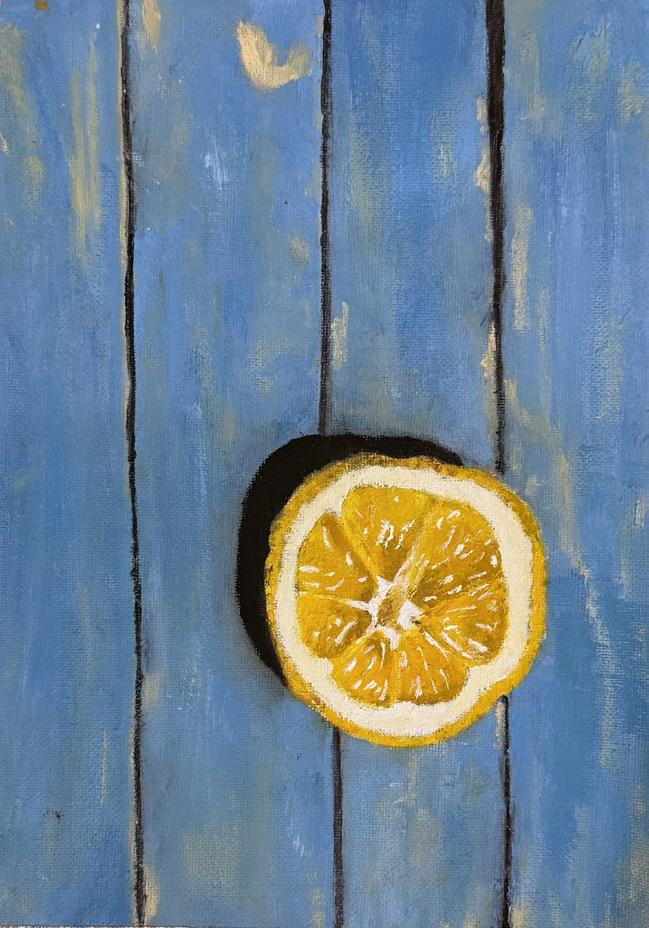
Nicole Hadar ’27
The sun is high, the day is crisp and dry
The rime always delights, the sky is bright
The hill is steep and long, the trees sky high
My heart beats fast, I feel the flight excite
My skis are long and sharp, standing up top
The trail is full of mounds of snow, oh no
My breath is full, I do not want to stop
A bluebird day, makes me love fluffy snow
The days grow long, the temp is high, goodbye.
The snow begins to melt, the season ends
We say farewell and bid adieu, and cry
For winter is over, wiedersehen friends
Don’t stress, Stowe calls us back to laugh and ski
This is my happy place to ski and be.
I hail from an endless generation of Cardmeg growers, my father a farmer and his father before that, and his father and his mother and her aunt on both sides (same aunt, just some incest), and her father and his father after that. Sometimes I joke that our family farmed Cardmeg since before the space age, when the world was less then 15,000 people. Then I guess the ships took off, and one carried my father’s father’s father’s mother’s aunts’ father’s father to a planet that no one else really wanted to live on, because it was the perfect condition to grow Cardmeg: hot, humid, and as flat as Earth. So he decided to grow some Cardmeg, because what else was there to do? Cardmeg really does grow best in areas that stagnate, areas that the residents want to leave but just don’t get around to in their entire life.
I don’t hate my life at all. Intergalactic trade has made us Cardmeg farmers get some business, after all. There’s only one kind of dish that call for Cardmeg: Calluk Cookies. But with a universe of a thousand billion, there’s now finally a huge demand for Cardmeg, a whole entire planet’s worth of Cardmeg. A planet with population 5,000. I used to think that number was small, when I was a younger teen. As an older teen, I am now proud and impressed. People were impressed and afraid of the Soviet Union, and Gramps said that nobody actually lived in the Soviet Union. So, I suppose if people were so afraid of zero Soviets, then they could really fear us 5,000 Cardmeg farmers. I don’t know how we got to be so many. My mother said it was the storks (I would imagine it took a whole Imperial Freighter to get them all here). My friend Brian says that he knows; he says the first man that got here must have been pregnant. Mom does joke that we are all related, but it is probably more than a joke because she refuses to take a genetics test with Dad.
I think my favorite thing to talk about is the sky. Somebody asked me if I liked to cloud watch, but I said no, because sunny weather was best for growing the Cardmeg. Then they asked me if I liked to watch the sunset, and I told them that I sure hope they don’t watch the sun, because you can hurt your eyes that way. Somebody else (not the same person, mind you— the original had walked away at that point) asked if I liked to see the night sky, and I told them I appreciated their concern, but our house had a roof.
This is why I like to talk about the night sky. a) see how, in this conversation, I have managed to avoid talking about Cardmeg for the most
part. b) liking to talk about the sky is very individualistic. Talking about puppies, Cardmeg, or Soviet politics is all well and dandy, but it is not my favorite, because that would be generic. Additionally, I am individualistic because I like to talk about the sky, but I do not feel any sort of affinity for the sky. c) the sky is blue. My favorite color is green, but the fact that the sky is blue means that it is not raining, and I do not like the rain. My favorite food is Persimmon. I like it because it is the fruit of the gods, and because I have never tried it. My second favorite kind of food is cherry pie, which I have every Friday at Auntie Wendy’s. Auntie Wendy isn’t actually my aunt (I think), but she is the only person who does not put Cardmeg in every single dish she makes, hence why I like her. Many roundplaneters probably think that we only grow Cardmeg here, but we do reserve 2 percent of our landmass for growing wheat and 1 percent for vegetable gardens. I asked Dad once what we did with our ocean mass, and he told me that we did not do anything with it; we do not have any ocean mass. I was going to ask him where we get water, but it’s probably from the storks.
When I grow up, I will finally break the family line: I will be a Cardmeg quality tester instead of a Cardmeg farmer. We don’t currently have one on the planet. It feels weird to say, but I guess I suppose I feel a sense of duty, to my g-g-g-g-great grandfather, that I make sure his descendants ship out quality Cardmeg. And I suppose that duty, too, is also to the galaxy behind the blue sky, whom we owe quality Cardmeg.
I missed you, Erna Your candlewax face and the gears in your eyes. I miss the moving things.
Black tile white tile
Limbless on the kitchen floor
Listless when I’m waiting for you, Erna. I should have froze in that hunchback hallway
Turned that key counter-clock-wise
Spun backward and never, never Been a marrying age, a sack size I saw them swaying
There goes my veil I saw them floating
All arm in arm
The stain on my hand closes doors
I miss the open things.

Myriad, myriad.
I’ve always liked that word. It contains all . The good, the bad.
It’s an uncountable number of things, circling, endless rings.
The future, the past. The first, the last.
Schrödinger’s cat. A magician’s top hat.
On and on. The apeirogon.
Never rare. A mirrored stare.
Myriad, myriad.
I’ll always like that word. Though many things are numbered, some continue to add.
Seven AM, and it’s still dark. Brush my teeth, hair tousled, eyes barely open, Dreaming of sunny days, summer camp, that spark, Working for the wishes that I’ve placed my hope in.
I drag myself onto the train, Through the cold, through the gray, Hoping for the light’s return, to heal the pain, Maybe the sun will find its way.
I hope to see a smile peek through the clouds, Will the sun shine?
Through the hallway’s dense crowd,
When the rays hit my face, will our joy align?
Maybe today, the sun and I will intertwine, Maybe today, I will be fine.
Nafplio
A young girl’s dress flutters as she excitedly enters the cafe.
The girl’s name is Lydia. She just turned 13, and she’s been living in Nafplio her whole life. The town’s become somewhat monotonous to her— the same street as she walks to school, the same houses beside hers, the same places she goes out to have fun with her friends and family.
But today is such a beautiful day that Lydia can’t help seeing Nafplio in a new light. She takes a seat at the window of the cafe, and as she waits to order her customary chocolate and orange cake with coffee, she looks out the window and appreciates the view.
Across the street there are three tall buildings stacked side by side—plaster walls painted blue, orange, and cream respectively. Peeking out from behind the buildings and crawling around the sides are lemon trees with full green leaves and trees that boast wild oranges. The cream building has a pale pink balcony with emerald vines winding around the railings. The sun shines off the terracotta tiled roof of the orange building, the tallest of the trio. The sky, bright and blue and clear, just barely makes it into the frame of the cafe window.
Lydia takes a deep breath. She ignores the sound of the toilet flushing in the cafe bathroom behind her and the numbing familiarity of the street ahead.
As she put aside these things, she realized that sometimes it takes the right light, a certain angle, to capture a beauty which you’d never noticed before.
Home 1: Stark white and stacked like blocks, sharp corners and tall
Home 2: Pastel pink with fun wavy door overhangings, and a roof topped with rounded dark pink tiles. In the landscape around it, cypress trees tall and slender like columns, a deep green color and shaped like elongated teardrops.
Home 3: Set in a city full of buildings in only creams, whites, tans, and pastels, like the walls have been bleached by the sun. This home has the classic white plaster walls and terracotta roof tiles.
Home 4: A low building with one, maybe two, floors, but the ceiling is covered with stacks of bright blue boxes of wares. Around this are fields of lime green and vibrant emerald, dotted with sun yellow and bright red wildflowers. The expanse is broken only by square patches of red brown soil with pale green olive trees sprouting in a row.
Home 5: A slightly run-down version of the classic plaster and terracotta, with browning walls and crumbling tiles, but it’s larger size and worn look gives it a grander air.
Home 6: A small building with a singular door and window in the front, where the red color of the terracotta has bled into the pale walls. Beside it is an expanse of trees in varying shades of green and brown, the only disruption a singular blossoming peach tree with pink flowers.
Miscellaneous Details
• Roof tiles with mismatched colors
• Clothes hanging from balcony railings
• Cacti with flat, circular appendages
• lavender everywhere
• In the ruins, soft stepping stones that, through millennium of use, have become smooth and shiny like silver silk
• A man on his balcony, contemplating life, looking toward the ocean
• Every home with more than one floor has a balcony
• Sheep with varying shades of cream, tan, and brown wool
i come to the realization not me i am the cat? a gun is pointed at my head the future depends on you, electron your butterfly equations the hand on the stamp of fate i am a heartbeat will my blood be spilled today? the clock counts down two states awaiting collapse i am a blank stumbling upwards in the dark if time travel existed i could prepare for the blow but i realize i have been waiting my whole life for this.
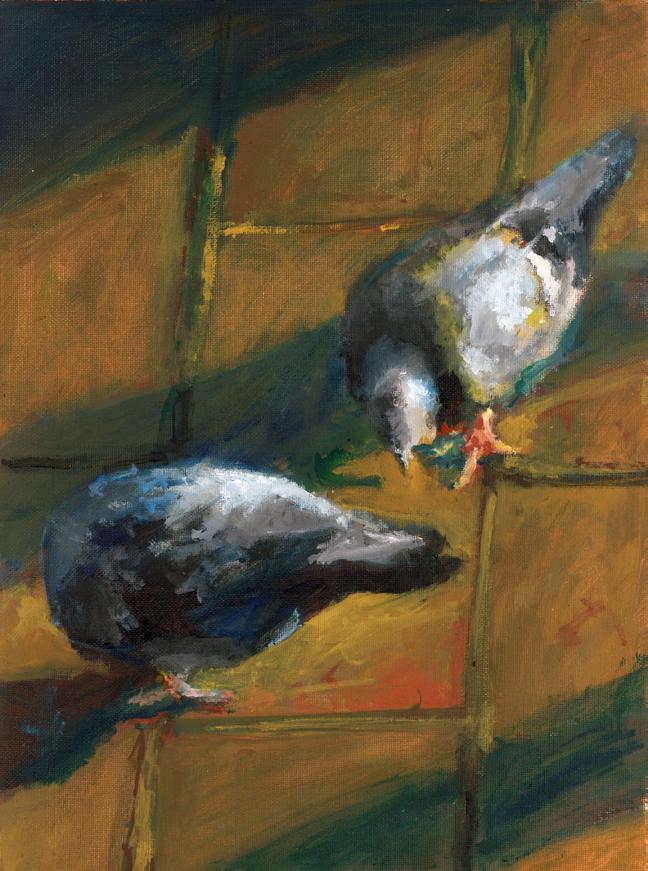
Finn Hoebelheinrich ’25
It’s quiet. It always is at this hour: too early yet for the first, crack-of-dawn laborers, but the late partygoers have already gone stumbling home for the most part, eyes hazy and movements awkward. If you had been the sort of creature inclined towards venturing past the city limits, they might have reminded you of the halting demeanor of a newborn deer. Occasionally, someone staggers out of some forgotten basement hangout in a halo of light, spewing forth whatever substances they’d ingested throughout the night in a great arc across the street. Mostly, though, it is silent and still.
You are serenaded by the rhythmic drip, drip, drip of the day’s rainfall trailing its way down and out of the gutter. This sound is typically what ends up lulling you to sleep after each long, aching night. You rest your head wearily on your folded paws as you gaze out into the street. You’re on the verge of drifting off when your eyes shoot open—a loud crash rings out from the alley across the way. The alley is the same deep black that permeates the corners of the city where the streetlights don’t reach. Just as you’re about to relax your guard, a young man barrels out of the darkness, the whites of his eyes almost glowing with the sheer force of his terror. He sprints through the street, nearly slipping on the oil-slick-colorful puddle of some unfortunate partygoer’s vomit, and wedges himself behind the same dumpster you’ve chosen to bed down next to for the night. Nothing follows him from the alley.
As soon as he’s behind the dumpster, he scrambles backwards against the rough brick wall. You tilt your head, wondering what he’s doing. He doesn’t acknowledge you at all as he starts mumbling to himself. The words themselves are lost on you in their jumbled torrent—all this time, and you’ve never managed to pick up more than a few snippets of human language—but the pure fear behind them is apparent. Slowly, silently, you push yourself to your feet and pad closer to him. He’s quieter now, still mumbling, but his eyes are glazed over, staring straight through you. Whatever he’s looking at, whatever he’s scared of, it’s not something you can see. You move closer still, sniffing at him. He stinks of fear and sweat, and he doesn’t react to your investigation at all.
You’re growing impatient, bored already with this new development, and you can’t remember the last time you ate. He’s blessedly, tantalizingly alive, nothing at all like the leathery dead messes that usually sustain you. He’s weak, vulnerable: an easy meal. You’re hungry. What else is there to do?
Your teeth at last sink into his throat, and snap together on nothing. You pull back with a whine of confusion. He looks as solid as ever, in body if not mind. The enticing smell of meat still dances around you. You bite down again, and again your teeth catch nothing but air. The fur along your spine begins to prickle upward, and you take a few steps backward. You swat at the man with one paw, and your limb swipes right through his body. A low growl finds its way out of your chest.
Uneasy, you back out from behind the dumpster. The man—whatever he is—remains, still cowering and mumbling, where you left him. You turn to look at the alley he came from. It’s a solid wall of black between two buildings, imposing in its sheer darkness. Slowly, hesitantly, you walk towards it, one halting step at a time. You’re not sure why you’re moving towards it. Every fiber in your body is screaming at you to leave, to find somewhere else to sleep tonight, but your sudden compulsion to investigate is overpowering. Finally, you reach the edge of the alley. The divide is harsh between the dim, familiar light of the street behind you and the allencompassing blackness in front. You take another step forward.
Instantly, it’s as if someone dropped a blanket over your head. You can’t see anything in the darkness. You shake your head, waiting for your eyes to adjust, but you remain as blind as before. There was nothing to do but keep walking forward into the alley. You shiver as you walk, the mild humidity of the street behind you giving way to a damp chill that penetrates you to the bone. You can hear nothing but your own footfalls.
You’re not sure how long you’d been walking—the alley seems to stretch on endlessly, and there’s no way to estimate how far you’ve come in the complete blackness—when you start to smell it. The stench crawls up your nose like something alive and squirming. You stop walking, shaking your head furiously in a desperate attempt to clear the air around you, but it only makes the smell more overpowering. It surrounds you—the air is thick with it. If you could think about anything but your need to get away from it, you’d believe it was malicious, almost, if such a thing can be true of a scent.
It’s awful, rotting, like death but nothing like death at the same time. You’ve known death. You were born and raised in the city; you’ve come across your fair share of the results of unfortunate overdoses, of things like you whose lives were cut short by speeding cars, of quiet surrenders to hunger in back alleys. This is something different, so much worse, almost alive in the writhing, all-encompassing sense of dread it carries.
There’s a high, keening whine winding its way through the air. It takes you a moment to realize the sound is coming from you. You force yourself to keep walking forward in the desperate hope that the smell would dissipate with progress. You aren’t so lucky, but after another while—you’re still not sure how long it’s been—you bump into something soft and fleshy and wet. You look down instinctively, forgetting the darkness, but to your surprise, your eyes have adjusted somewhat, and you can make out just enough to tell that the shape underneath you is human. You lean closer and realize with a start that it’s the same man from behind the dumpster.
He’s undeniably real now. He’s also undeniably dead. His eyes are wide and panicked, staring at nothing. Your gaze trails down his body from his head to the place it abruptly stops, where he is messily bisected at the waist. His lower half is nowhere to be seen. In the darkness, you can only just make out the loops of his intestines, scattered almost delicately across the asphalt. It’s this sight that finally breaks you from the stupor that has carried you this far down the alley. You turn tail and run, sprinting back the way you came. The dull thuds of your feet hitting the pavement and the rapid, arrhythmic thumping of your heart fill your senses. The smell, so overpowering before, is nothing to you now in your all-consuming terror. At last, you plunge forth into the comforting light of the city. Your legs carry you across the street until you collapse in a heap in a doorway, chest heaving rapidly.
You’re alive. You’re alive. Breathe in, breathe out, breathe in; again and again until your muscles aren’t coiled tense like a spring anymore and you can close your eyes to chase the darkness of sleep without feeling the smell start to crawl up your nose again. You’re alive. You need to get out of this city for good. You rest, too exhausted to move for now, but knowing that as soon as you can stand, you’ll get as far away from here as possible. * * *
In the light of the new dawn, a tenant will come downstairs on her way to work to find a stray dog sleeping at her doorstep. She will kick at it in annoyance, and when her foot passes cleanly through it, she will chalk it up to a lack of sleep playing tricks on her and move on with her day.
Now, though, far from the woman’s apartment, the same dog stares without seeing into the darkness, unmoving as its life leaks out onto the asphalt. The city is quiet.

“Take
I crave the feeling of “taking it slow.” I also run from that feeling as fast as I can.
Sometimes “taking it slow” is like going for a walk. You have nowhere to be and nothing to do, so you feel each step you take through the city streets or the forest path or the sea shore. You smell the closest pizzeria, or the crushed pine needles, or the salty breeze. You notice the colors of the building ahead of you, or the flowers beside you, or the sky above you.
But then there’s the “taking it slow” that feels like trying to fall asleep. You lay motionless as you think about everything you have done, or want to do, or are doing tomorrow, or need to do. And while you’re just existing, you can hear the rush of traffic, or the scurrying of night animals, or the rustle of plants. You long to join the commotion but are simply too tired to do so.
I love the feeling of “getting it done.” I also avoid it like the plague.
Sometimes “getting it done” feels like winning a competition. You were a master of choosing what’s important—effortlessly bypassing wastes of time to focus on your training. You run 5 miles every morning and feel yourself getting faster and stronger. You study for 2 hours every night and know your wealth of knowledge is expanding and evolving. You practice an instrument twice a day and hear your music become smoother and more beautiful. You sketch during every free minute and see your lines get more confident and unique. Then you get a badge, or a scholarship, or a trophy, and you hold it and feel the fruits of your labor. You hang it up or save it for your future or place it on a shelf and are reminded of how amazing you are by its presence.
Other times, “getting it done” feels like doing the dishes after a holiday lunch. You wash and scrub as the water wastes and your fingers wrinkle. By the time you finish, a sibling has used another cup or spoon, you’re a bowl of cereal or dessert, your parents need to get started on the next meal. And you have to do the same routine every day or else you’re dirty, lazy, incompetent. Getting it done and taking it slow should be opposites, but too often they arouse the same meaningless feeling in the soul—
So my life is a series of going back and forth, like a door swinging after being pushed open. I don’t know when it will stop swinging, and whether it will slam closed or yawn wide open.
Outside, you notice the people first. There are five or six of them smoking out on the corner; their breath, fogging in the autumn cold, adds to the haze around them. They’re dressed in black, mostly, with some white, some red. One of them has a hat or a jacket, or maybe a pair of pants, thats covered in patches. They’re all talking with each other, laughing, probably, but you’re still intimidated. You try to shrink into your coat as you walk past them, following your friends towards the entrance.
Inside, you notice the heat first. It’s a heat of breath and crowded bodies, and of barely restrained motion. You’re drenched in it immediately. The energy in here is a dam about to burst. The first band hasn’t made its way onstage yet, but everyone is milling around, standing in corners, waiting. There’s already a faint rhythm to the room, you notice, a beat of tapping feet and constant chatter. The place smells fine, but your friends have jokingly assured you that’ll change soon. You hope the people can’t smell your fear.
You’ve been standing in the entrance this whole time, just taking it all in, but suddenly, someone walks past you through the doorframe, bumping against your shoulder or maybe your back, and you reflexively turn to look, and you see him for the first time. But you’re too anxious to remember anyone, really, and too overwhelmed to care about anything beyond what you look like right now. You head for the bathroom next to the short stairs leading up to the stage and lock the door behind you.
Thank god it’s a single stall. I need some space right now.
I breathe for what feels like the first time in forever. There’s so much pressure out there, and I feel eyes on me at all times.
I feel out of place.
In the mirror over the sink, I only see myself—not a metalhead, or a punk, or whatever all those people call themselves. Just a boy playing dress-up.
I breathe again.
I tell myself that it’s dark and that everyone’s here for the music and that no one actually cares. I’m sweating. I shrug off my jacket and try to believe those words as I step back outside.
Your friends are waiting for you, and you all eventually make your way to the back of the room, passing the first band as they start making their way onstage. The crowd is heckling them, but when the singer throws her head back and laughs in response, waving it off, you know it was all an act. You hadn’t realized that the show had already begun, that everyone there was a performer. You hope you won’t be expected to perform, too. You want to watch, nothing more.
The drummer sits down and the guitarist messes with his pedals, and you look around and really take in the space. The venue is small, cramped even. The club is divided into three parallel sections, with the bar on one side and the merch tables on the other. The stage and the ground in front of it are in the middle, and take up most of the space. Your friends point to the populated center of the room and mutter excitedly. The whole room is bathed in red and blue. Soon, paler lights in the adjoining sections shut off, and the chatter fades to a growl before rising to a roar as the music starts. And you glance around, startled by the suddenly untamed energy around you, and you see him again. You see him see you.
And the Pit washes you away.
Some time has passed, and you don’t know how to feel. Your friends dove toward the center, and left you drifting without anyone to moor yourself to. You remember swaying near the back, shoulder to shoulder with strangers. Your eyes were closed. You might’ve smiled. But then the music slowed and stopped, and you remembered where and who you were, and you hugged your arms in close. And you looked around and found your friends, and chuckled softly when they joked about you starting to like the music, but you didn’t let go of your arms again. So you left the crowd and now you’re at the start again, outside looking in. It’s too hot in here, even in your T-shirt. You grab your jacket from the pile by the door and head outside.
The cold feels nice. It blurs my eyes and presses on my nose and ears, but it’s nice.
I don’t know what to think.
But there are people out here smoking, and I don’t want to look confused. I want to look used-to-this. Confident. Anything but lost.
I need to get more used to this.
The building against my back is so cold it feels like it’s burning. I press into it. I start to shiver, so I pull my arms in again. I only see my shoes and my shadow, and the concrete sidewalk beneath both.
There’s another pair of shoes against the wall a few feet away, on the other side of the door. I sneak a look up to see who they belong to, but I quickly snap my head back down. He was looking at me. He saw me see him. I hope he thinks my ears are only red from the cold.
His shoes turn towards me.
Fuck.
“Want a hit?” I look back up. He holds out a cigarette to me.
“Nah, I’m good man. But thanks.” I think that sounded natural. I hope that sounded natural.
It’s silent for a moment, as he smokes. I look out at the street.
“Good set, huh?” I turn back toward him, trying to meet his gaze. I wind up somewhere near his nose.
“Yeah. Great.” I hadn’t noticed it. I had heard sound, sure, but not songs. I don’t understand what was musical about it.
He steps toward me, taking one last drag. “I saw you before, y’know. Earlier tonight. Right before the music started.” He breathes out smoke. “You looked kind of scared.”
Fuck.
I try to laugh, but it comes out squeaky. “Yeah. It’s my first show. But I had a good time. I’m enjoying it.” Not a complete lie. This show’s been nice. Or it was, briefly.
“Okay, that’s good, that’s good.” Another pause. I look away again “You sure you don’t want a smoke? It’ll take some of the edge off.”
“Thank you, really, but I’ll pass. I’m waiting for a pick-up anyway.” A total lie. To make up for it, I finally look him in the eye. I do recognize him. Same hair, a pale blonde, same tan skin. Under the streetlamps, though, his eyes are lighter than I thought. They’re blue. They’re mesmerizing.
Those eyes turn toward the door. “Well, I’ll see you at some other show then, I’m sure.” He drops the cigarette and grinds it out with his heel.
“Yeah, see you.” Fuck. I want to see him now. I want him to stay here, and to keep talking to me. I was just beginning to forget to feel self-conscious. He turns fully toward the door, but I catch his eye one last time before he heads inside. I can’t place the look on his face. Puzzled? Hungry?
I text my friends to tell them that I have to leave and begin to walk toward the bus stop.
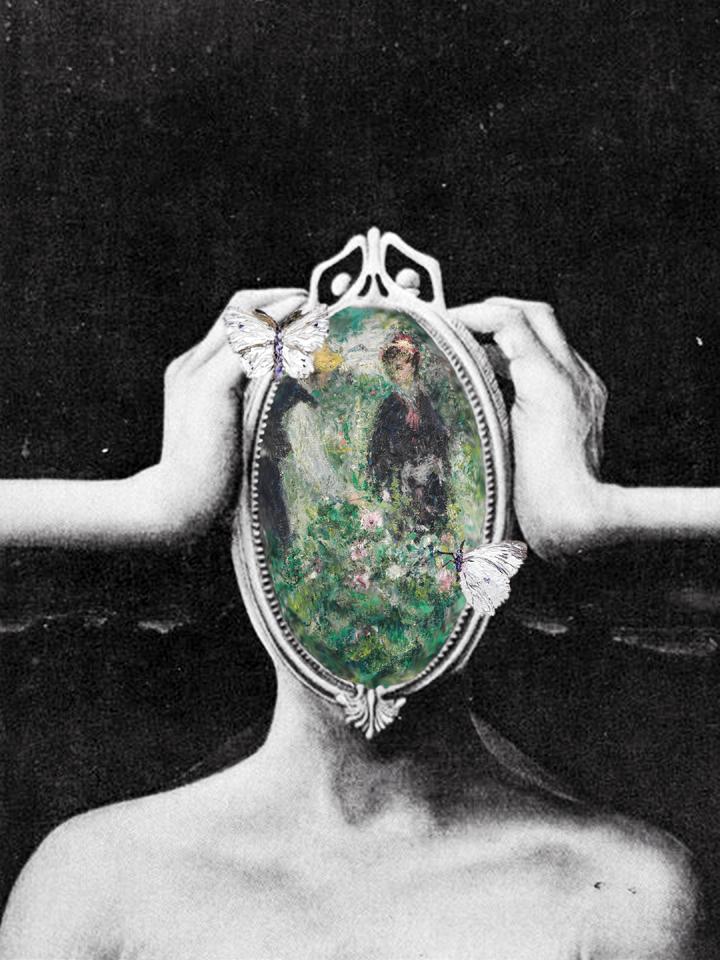
Lauren Sadka ’26
Why do we only stop and think When we start to break?
Why do we only put pen to paper When we want to escape?
Why do we only feel the love around When our hearts and minds are shaken awake?
Why do we only hold onto each other When the world around us starts to Brake?
Surrounded by beauty
In all its peace and quiet . . . Breathe it in before it takes your Breath, Tune out the feral riot
The sun will always set The sun will always rise The wind will always blow Clouds into blue skies
Those clouds were once above the city
They were once above the sea They were once deep in the ocean Before they rose and came to me
The sky will always blush When the sun meets the sea
So Do you need hues of gold To see the love around me?
Blindly searching for the sun
We’re too busy wanting more Sometimes we don’t see, we’re In a life we used to pray for.
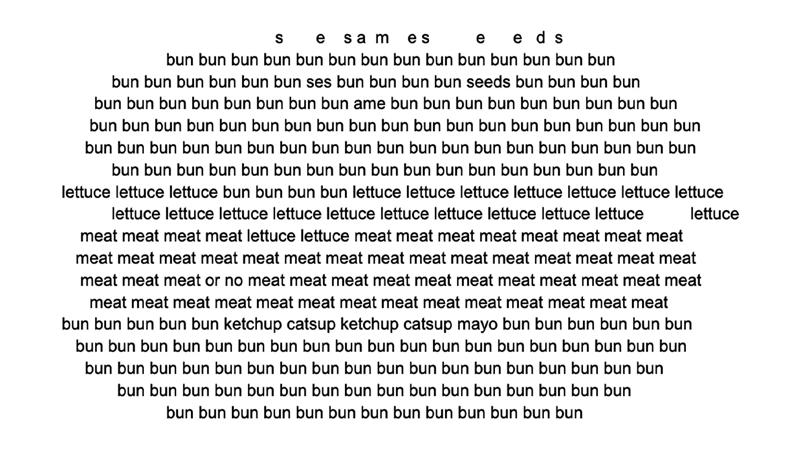
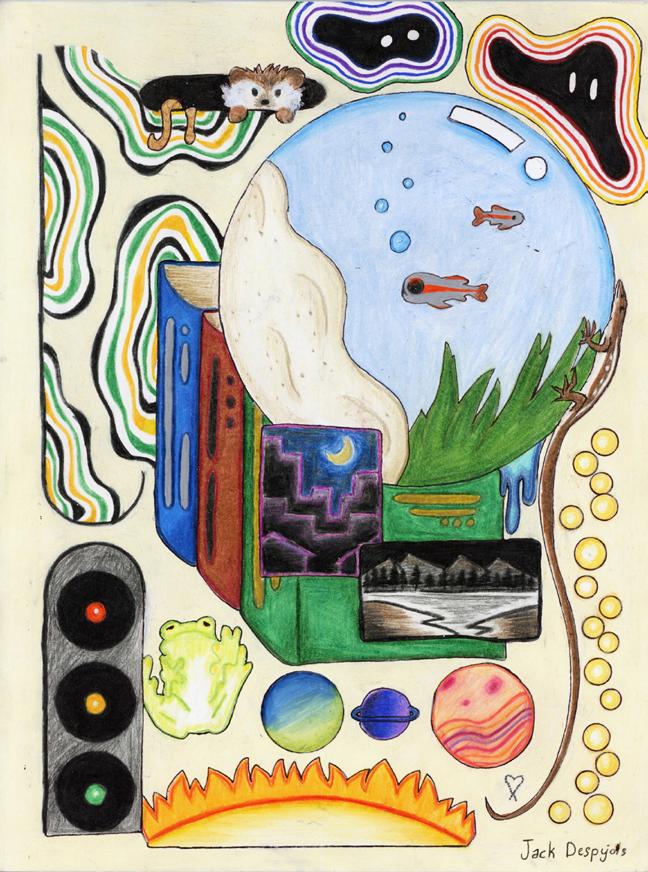
The orb in the sky hovers. The oil-paint white standing out among the black backdrop. Gray dots spatter across the canvas, created by the large brushstrokes of asteroids.
More spots glitter in the periphery, White, red, blue, yellow, pink. Galaxies. Nebulas. Stars.
It’s an empty painting from afar; the various colors faded due to years of tarnish.
Yet it’s a painting we spend trillions of dollars on, just to look at what we can’t see on our own through the fog.
Yet this perfect work of artistry may save a burned one someday, for the easel we stand on is rickety, being eaten by termites.
It smells like you And then like bleach. I’m not half as sweet as the plum soaked clouds melting like candy in the early winter dusk. I miss you like something I buried for later. Cobweb head because I can’t remember where but I still feel the coddle and the crush. Now my bed is only for unswaddling. I want my heavy coins My smudged up letters My unpaired knee sock I want that laundry detergent cologne. All I get is this stupid silver Buddha. This tarnished trinket stings and he’s laughing at me. I think you dug a tunnel to China.

I’d love to
eat dirt, I mean
It’s where life lives
It’s under the greens
It’s under the sunlight
It’s there when the moon’s bright
The dirt doesn’t care
It keeps its place down there
It’s in the ground and I can’t bear
To see it waste away there
I want to consume
Yet it’s not still, it moves
If I wanted to, I would
Rot outside I mean,
To lie down forever,
While the dirt keeps me unseen
I want to feel it
In my esophagus
Down my lungs
And feel its grit
If we all are bones
Then the dirt holds all of us
The dirt holds our hands
And makes pain seem small enough
To put in a box
And bury in the yard
Because whatever pained us is gone
The dirt helps us move on
If I eat the dirt
The ground will be in me
Before it’s my turn to feed
Mother Earth that’s beneath me
I see you even less now
Though I admit that’s the plan
I saw you lurk in empty streets
How ardently I ran
I see you in the shadows
And I see you in the span
The feathers of a cobalt crow
And every ghostly hand
That dig fingers in my aching flesh
And pull each umber strand
Force me back to by your side
Though I don’t understand
You claim to hate my presence
Yet you endlessly demand
To hear the drip of honeyed words
Like dragonfly to fan
Like flower moth to black light
A ship to rocky land
And still, my body’s made of glass
My blood trickles like sand
You spin me to fit all your truths
And selfish lies of man
But a boy cannot overcome time
With just delusions grand
And yet you make the same mistake
And act like things aren’t changed
You act like we are both alive
Like I am not estranged
Like you didn’t reap my flesh and bone
And banish me below
You act like you cannot decide
If I am friend or foe
You beat a corpse with sharpened words
I smile through each blow
Like birds pecking at carrion
You smile like a crow
All beak, no teeth, and nothing soft
Cruel mouth and cries of woe
You keep hearts beneath your floorboards
And you steal each trick from Poe
And unlike flesh, you cannot seem
To reap each thing you sow
You build maizes out of purple corn
You wait and watch it grow
And as you trace our confines
All others stop and stare
Because my love what they can see
Is that there’s nothing there
And when I try to walk through walls
You pull me by my hair
Call me a ghost, a phantom freak
In what world is that fair
Cause it’s you who haunts these hallowed halls
All others must beware
Only you can claw and scrape
And only you cant ear
Only you can scream at me
I silently despair
You can whisper of my name
While I am unaware
The walls echo it back to me
So all your squawks are bare
And yet you now shadow me still
With that cold deafening glare
And yet your words they soak my skin
And whisper like the rain
And then you act like you are trapped
And I’m your ball and chain
But I have left you all alone
And yet you still complain
I hide away when you are near
And you just cause me pain
You torment my peripheral
That is your sole domain
Your existence is so futile
Yet still I am the bane
And you still search for mirror shards
What have you left to gain?
You splintered what was left of us
It’s simple and it’s plain
You can’t can’t paint my bloodied flesh
With who we used to be
You can’t carve my ribboned skin
When I want to be free
Why can’t you just leave me alone
And God why can’t you see?
That your chance is buried with me
In the graveyard of your past
You can try to dig me up but
No matter how damn fast
You try you cannot catch
The dying once they’ve passed
Into the hands of gentle death
You cannot make me last
And she is kinder to me
Than you had ever tried
She makes me smile for each time
You grimaced while I cried
She will soar for every time I wish that we had flied
Yet you cut off our feathers
We fell into the tide
Two strokes of black in grayish sky
At least I somewhat tried
Flapping my wings that would not work
Because what you decide
And you can swim and I cannot
And you cannot abide
The sound of hacking awful coughs
And water-filling lungs
You can’t stand my spluttering
My awful tied-up tongues
You can’t stand the ladder out
But make me reach for rungs
You prune my pretty feathers
And you tell me still to fly
You complain that I’m a frigid corpse
But ask me not to cry
You tell me to stop haunting you
But can’t murmur goodbye
You tell me pay attention
While you reach to carve each eye
You stitch my lips together
And then you moan and sigh
You slice with words and cruelties
And don’t let me ask why
And when I stand up for myself
My legs you’ll harshly tie
You pin me like a specimen
And tell me to fly high
And when they ask you what I am
You’ll write a pretty lie
You’ll eat my heart on dinner plates
You’ll carve into my thigh
You’ll tell me to be silent
When I beg to see the sky
And you wish I wouldn’t haunt you
But refuse to let me die
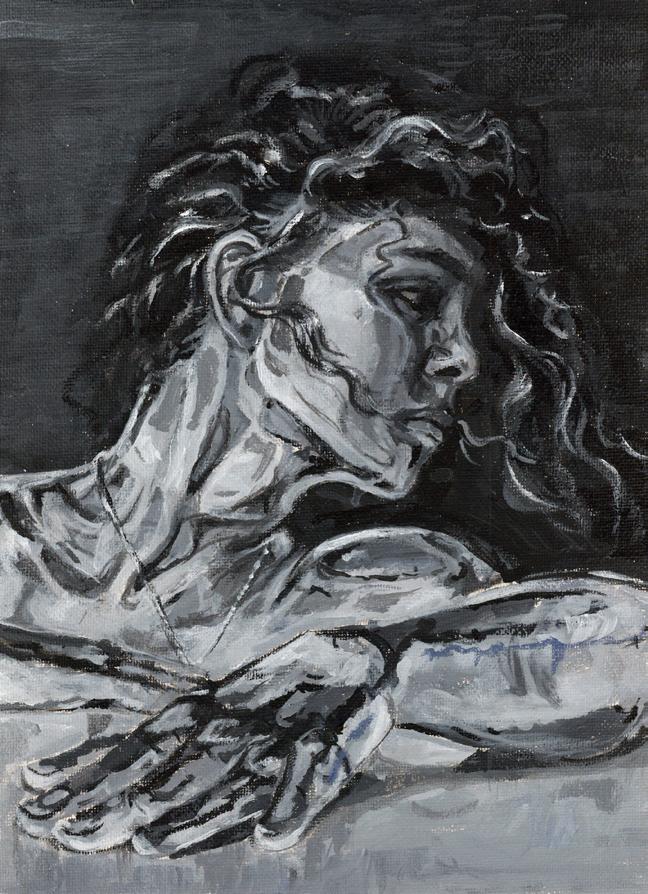
I envy your glow but fade too fast, I can only grasp a reflection of your blast, Your touch ignites the world with gold, While I watch as the warmth turns cold.
Your sunlight wakes the world anew, But at night, they barely pull through, At dawn, they’re drawn to your shimmering light, At dusk, they’re stuck in the cold, dark, night.
People only turn to me in darkness and despair, for you, people wake, they stop, they stare, You paint the sky with hues divine, A blush that lingers for all of time.
I admire your fire, your energy, your flame, Burning untamed, yet they praise your name, I play the sunflower’s solemn game, Turning toward you, lost in your name.
I can’t wait until we meet again, For years we’ve been apart, I’m counting down the days until, A total eclipse of the heart.
Little do you know it’s lonely up here, I shine so bright, still, none draw near, I wish I could be with you among the stars, But I’m bound to stay here, behind blue bars.
My crown of fire, so wild and bright, My restless blaze, it shuns the night, But I envy the unshaken, calm, and true, Silent rock in a silver hue.
I can’t wait until we meet again, For years we’ve been apart, I’m counting down the days until,
A total eclipse of the heart.
The day had begun just like any other. In the thick, humid haze on the morning of August 4th, 1892, Police Chief Hilliard sat at his desk in the Fall River, Massachusetts, police station. He was sorting through reports when the telephone rang. A murder had occurred in the Borden household on Second Street, and the victims were the owners, Andrew Borden and his wife, Abby. The discovered bodies had been treated with brutal, calculated violence—beaten beyond recognition. With no time to waste, Hilliard grabbed his hat and coat, instructed his partner to gather officers and detectives, and immediately set out for the scene.
It wasn’t long before Hilliard saw the grim sight of the Borden house looming ahead. The odd silence struck the detectives in the neighborhood. The old two-story structure looked out of place against the backdrop of the calm, peaceful neighborhood. Hilliard and his team moved quickly. Their boots thumped against the unpaved road outside the home. Lizzie Borden, their surviving daughter, was already waiting outside. The officer didn’t have time to dwell on her appearance— his focus was on the scene inside.
Upon entering the Borden home, there was an unmistakable scent of death. The air felt thick and oppressive. The first body the officers encountered was that of Andrew Borden, found on the living room couch. His head had been struck with such force that it was barely recognizable. The sight was disturbing—the violence seemed so random. Oddly, his watch and pocketbook remained undisturbed, suggesting that the motive wasn’t robbery. Even more chilling was the lack of signs of a struggle. It seemed as though Andrew had been caught by surprise.
The second body was found upstairs—Abby Borden. They found her face down in the guest bedroom. She was disfigured beyond recognition, her skull shattered in several places. What struck Hilliard was the proximity of the two bodies. Someone had been methodical. Abby’s body showed signs she had been attacked while she was moving or kneeling. Perhaps in a desperate attempt to flee? These murders were unlike anything Hilliard had seen before. No forced entry into the household suggested the killer was someone quite familiar. So, they turned to their daughter, Lizzie, and their maid, Bridget Sullivan.
Lizzie claimed to have been in the house at the time of the murders but insisted that an unknown intruder had carried out the crime. The police also questioned the maid, Maggie, who had been cleaning the windows
outside during the time of the murder. Maggie claimed she was unaware of the horror that had unfolded inside and gave her account, a crucial part of the investigation.
Maggie was lying on her narrow bed amid the heat of August. She’d just come in from washing the outside windows, and her head throbbed from a raging headache. The distant clang of the City Hall bell announced the hour—eleven o’clock—and she closed her eyes, hoping for a moment of peace.
But then, suddenly, Lizzie’s shouts broke the silence. “Maggie, come down! Come down quick; Father’s dead; somebody came in and killed him.”
Maggie shot up from her bed, her heart racing. She barely registered the heat as she swung her legs over the side and scrambled to her feet. Maggie sprinted downstairs to find Lizzie, and they went to the living room, where Andrew’s body was discovered.
Maggie’s account just wasn’t adding up. For one, Lizzie’s words seemed odd; why would she, being present during the murder, not mention the gruesome sight of her own father’s body or immediately call for help? Instead, she simply stated the facts. Her calm, almost detached response didn’t match up with the horror of the murder.
Maggie’s testimony seemed genuine, but the evidence pointed to Lizzie as the prime suspect. According to the trial testimony, three witnesses saw Lizzie attempting to purchase prussic acid, a deadly poison, shortly before the murders. Witnesses also claimed she was wearing a blue dress on the morning of the murders, and a blue dress similar to Lizzie’s description in her testimony was later found burned.
With the evidence collected, Chief Hilliard was convinced it was Lizzie, and so was the public prosecutor. However, during the trial, her case was dismissed despite her involvement being clear. According to the jury, she was released without charges because there just “wasn’t enough evidence” to convict her. However, there might be another reason. In my opinion, Lizzie Borden was not convicted because she was a woman.
In the 1890s, the women’s suffrage movement had just begun. Women were expected to focus on housework and domestic matters. They were not allowed to own property. In other words, women were considered less than men, and naturally, their physical abilities were too. The entire jury for Lizzie Borden’s trial was made up of men. According to a report from the Boston Daily Globe, Borden’s lawyer instructed her to dress in black and sob in the court, showing her vulnerable side and reinforcing the gender stereotypes in the late 19th century—that women were inherently weak
and incapable of violence. The idea that women commit such a brutal act was unthinkable at the time.
The social and historical background in the 1890s allowed the lawyer and Lizzie Borden to play into the stereotype. It successfully swayed the jury—above multiple witness accounts and physical evidence—that Lizzie Borden was innocent because a woman couldn’t commit 1st-degree murder.
For us today, it might be hard to understand how stereotypes can supersede real evidence and set a suspect free. However, if we review the cases in the past hundred years, tragedies like the Central Park Five were similar in the way that the jury was biased because of societal stereotypes and discrimination. Lizzie Borden’s case, while centuries old, still resonates with us today. Though Lizzie Borden’s story has faded from the headlines of newspapers, her case is a reminder that justice is not always as unbiased. Many of us would like to believe that stereotypes and prejudices could never influence a jury. Her story forces us to ask: How much of what we know about a case is shaped by our subconscious beliefs rather than what the facts suggest? It challenges us to confront the uncomfortable truth that bias can be just as dangerous as any weapon. For Lizzie Borden, it was a powerful tool that let her evade criminalization. Her story may be over, but the lessons we can learn from the Borden case still remain relevant. Justice, it seems, is always a work in progress.
Works Cited
Linder, Douglas. “Testimony of Bridget Sullivan in the Trial of Lizzie Borden . ” Famous Trials, UMKC School of Law. https://famous-trials.com/lizzieborden/ 1460-sullivantestimony
“August 3 & 4, 1892—The Borden Murders Timeline.” Tattered Fabric: Fall River’s Lizzie Borden. https://phayemuss.wordpress.com/2007/08/02/august-3-4-1892the-borden-murders-timeline/
Linder, Douglas. “Borden Jury Found.” Famous Trials, UMKC School of Law. https://famous-trials.com/lizzieborden/1425-news14
“Trial Testimonies Compared.” Lizzie Andrew Borden Virtual Museum & Library. https://lizzieandrewborden.com/trialtestimoniescompared.htm
“Arrest and Trial of Lizzie Borden: Topics in Chronicling America.” Library of Congress. https://guides.loc.gov/chronicling-america-lizzie-borden
Conforti, Joseph. “How Lizzie Borden Got Away With Murder.” Smithsonian Magazine. https://www.smithsonianmag.com/history/how-lizzie-borden-gotaway-with-murder-180972707/
“The Trial of Lizzie Borden: Chronology.” UMKC School of Law. http://law2.umkc.edu/faculty/projects/ftrials/lizzieborden/bordenchrono.html

In 2023, BUA embarked on a year-long journey to alter our school’s important mission statement! Let’s look over some of the options that didn’t make the cut.
At Boston University Academy, kind and curious students who love learning are challenged to read deeply and think critically, to explore adventurously at Boston University, and to make it across University Road before the flashing red number hits zero.
At Boston University Academy, kind and curious students who love learning are challenged to read deeply and think critically, to explore adventurously at Boston University, and to order from Starbucks without their chem teacher noticing.
At Boston University Academy, kind and curious students who love learning are challenged to read deeply and think critically. But delete any emails from Camilla Weaver. Don’t read those deeply.
At Boston University Academy, kind and curious students who love getting into college are challenged to join Student Council and work very hard to make significant contributions to the community!
‘Tis no secret that I enjoy the night, Like poets writing prose, visionary, My dreams, thoughts, and creations do take flight, My best ideas are sublunary.
She hears them all, my thoughts, my joys, my woes By any other ear, I’d be a loon But no! She’s on my side, knows friends from foes Sees all with gentle eyes, my friend, the Moon.
On nights too bright, when one can’t see the stars, Her greed overtakes the sky, and fills my room, My restless rest cut short with scimitars, With balance gone, I look fresh from a tomb.
But she comes every night, through wax and wane, Eves pure and vile, my friend comes back again.
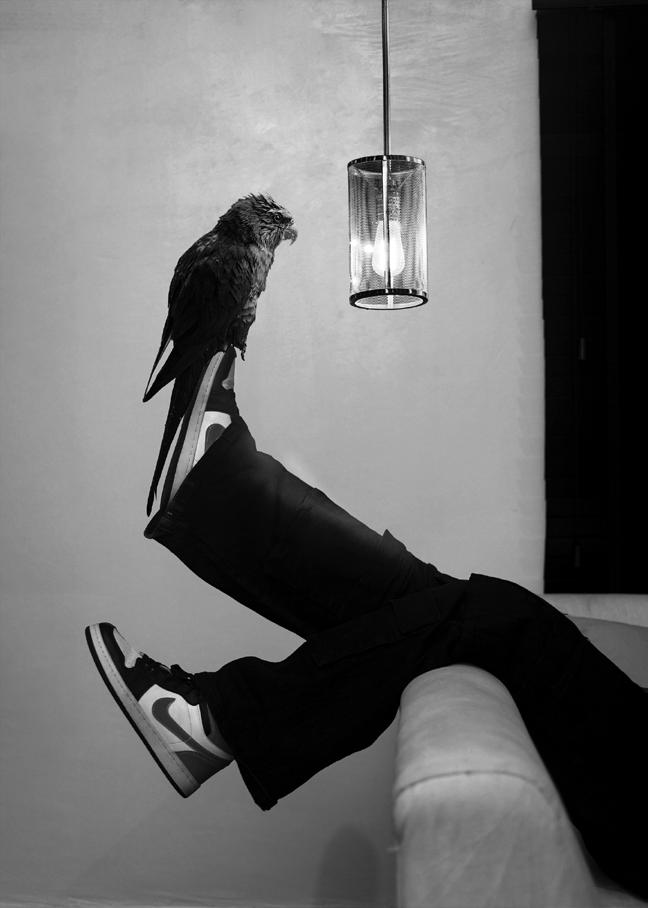
Georgie Linscott ’26
The marsh vexes. It stinks, slows me to a snails’ pace, gives everyone malaria, and its dark water gets in the coffee bean bags. But it’s the only way in without guards, and the only way for me to make a living these days.
No one likes to admit it, but black market coffee’s the only way to keep the offices running during wintertime since the power went out. Most people’s power, at least. And they call this a land of opportunity.
I take my opportunity. I ferry it around, I shell it, I sell it.
1 A Story Exactly 100 Words Long
This is a sleep-deprived poem that I made all on my lonesome. Amidst all the ho hum, my brain has been shown some drifting thoughtless thoughts, leaving me feeling brain-dead. My vision filled with spots, nothing left in my head, but I’m stuck awake instead. Oh, how I wish to retire to my bed.
